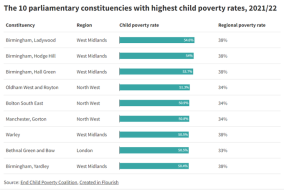Three of Greater Manchester’s parliamentary seats now feature in the list of the ten constituencies with the highest child poverty rates in the whole of the UK according to figures out today
OLdham West and Royton,Manchester Gorton and Bolton South East all feature in a report that shows some shocking statistics on the levels of UK child poverty.
Shockingly 7 in 10 children who are in poverty live in households have parents who are in work, according to data while only the North East and the West Midlands show greater levels of poverty that the North West
 71% of children who were in poverty after housing costs, and 67% of those who were in poverty before housing costs, were in a family where at least one adult was working.
71% of children who were in poverty after housing costs, and 67% of those who were in poverty before housing costs, were in a family where at least one adult was working.
Before housing cost data of poverty by region and household work status shows that the North East has the highest levels of in-work poverty, with 67% of children in poverty in working families.
44% of children in lone parent families are in poverty after housing costs. This is compared with just 25% of children in couple parent families while the poverty rate for children in families with three or more children was 42%, compared with 23% and 22% among children in families with one or two children, respectively.
Children living in a family where someone is disabled had a poverty rate of 36% after housing costs, compared with 25% for children living in families where no-one is disabled.
Child disability stats and regional figures show that in the highest rates of poverty for children with a disability is in the West Midlands, where 40.8% of children with a disability live in poverty.
There are persistent ethnic inequalities in child poverty across the UK. 47% of children in Asian or Asian British households and 53% of those in Black households were in poverty after housing costs, compared with just 25% of those where the head of household was White.
Joseph Howes, Chair of the End Child Poverty Coalition, said: “The pandemic and cost of living crisis have meant more and more children are having to go without food and a warm home. These statistics show that the trends in child poverty are particularly worrying in parts of the UK such as the North East and Midlands.
“There is one policy change that we know would make a direct and immediate difference, and that is to scrap the two-child limit for those claiming Universal Credit. The policy is unfair in the indiscriminate impact it has on children, and there is no evidence it has achieved its aims. Abolishing the two-child limit would immediately lift 250,000 children out of poverty, and the government could make this change now.
“We were encouraged to hear in January that the Labour Party is reviewing the policy, yet they must commit to scrapping it altogether ahead of the next election if they are to successfully deliver on their commitment to lead an assault on child poverty.”
Liv Eren, age 19, from Halton, in Cheshire, also grew up in a family on a low income and is an End Child Poverty Coalition ambassador. She said: “I am one of many young people who despite living in a working household, has still grown up in poverty. I am still haunted by the experience of growing up ‘without’ for lots of things that others would describe as necessities: proper school uniform, a decent packed lunch or even the having heating on in the house. It is harrowing knowing that there are so many who are deeply struggling.
“We are not just statistics, we are individual people who deserve and need support”.







